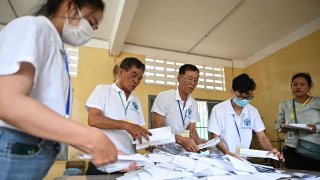
Cambodia's longtime ruling party on Monday lauded its landslide victory in weekend elections as a clear mandate for the next five years, but the United States said its stifling of the opposition meant the vote could not be considered free or fair and that Washington was taking punitive measures.
Autocratic leader Hun Sen's Cambodian People's Party won 120 of 125 available seats in Sunday's elections, according to preliminary results.
The 70-year-old, who has been in power for 38 years, has said he plans to hand the prime minister's job off to his oldest son, 45-year-old Hun Manet, who is Cambodia's army chief and won his first parliamentary seat Sunday.
It is part of what is expected to be a broad generational change in top positions for the CPP. And while it is not yet clear exactly when Hun Manet might take over, Hun Sen has suggested it could be as early as within the next month.
Get Philly local news, weather forecasts, sports and entertainment stories to your inbox. Sign up for NBC Philadelphia newsletters.
On his Facebook page Monday, Hun Manet said the election result showed that the “Cambodian people have clearly expressed their wills through votes,” adding that he thanked Cambodians for their “love and confidence in the CPP” and pledged that the party would “continue to serve Cambodia and Cambodian people better and better.”
Following a challenge from the opposition Cambodian National Rescue Party in 2013 that the CPP barely overcame at the polls, Hun Sen responded by going after leaders of the opposition, and eventually the country's sympathetic courts dissolved the party.
Ahead of Sunday's election, the unofficial successor to the CNRP, known as the Candlelight Party, was barred on a technicality from running in the election by the National Election Committee.
U.S. & World
Stories that affect your life across the U.S. and around the world.
The U.S., European Union and other Western countries refused to send observers to the election, saying it lacked the conditions to be considered free and fair. Russia and China were among the countries that did send observers.
Late Sunday, the U.S. State Department said it had “taken steps” to impose visa restrictions “on individuals who undermined democracy and implemented a pause of foreign assistance programs” after determining the elections were “neither free nor fair.”
“Cambodian authorities engaged in a pattern of threats and harassment against the political opposition, media, and civil society that undermined the spirit of the country’s constitution and Cambodia’s international obligations,” State Department spokesman Matthew Miller said.
“These actions denied the Cambodian people a voice and a choice in determining the future of their country.”
Michael Greenwald, spokesman for the U.S. Embassy in Phnom Penh, said Monday the visa restrictions would be placed on people involved in “threatening and harassing the political opposition, media and civil society” but he would not specify who or how many individuals that would entail.
Similarly, he would not elaborate on the scope of the pause of foreign assistance programs, saying only that it involved “several” new activities, and noting that the U.S. had contributed some $3 billion dollars to programs over the last 30 years.
The State Department urged the CPP to use its new term to restore “genuine multi-party democracy.”
Regional advocacy group ASEAN Parliamentarians for Human Rights called on all democracies to denounce the elections.
“We must pressure the Cambodian government to end all forms of political persecution and immediately and unconditionally release political prisoners," said Eva Kusuma Sundari, a former Indonesian lawmaker.
"There must also be an independent investigation into human rights violations and electoral irregularities, with the aim of ensuring accountability,” she added.
Under Hun Sen, Cambodia has become the Southeast Asian nation with the closest ties to Beijing, and China's Foreign Ministry on Monday made no mention of any concerns about the way the elections were handled.
“As a good neighbor and friend, we warmly congratulate Cambodia on the successful holding of the 7th national election,” spokeswoman Mao Ning told reporters.
“We believe that Cambodia will make greater achievements in national construction and development in the future, bringing more benefits to its people.”
With the Candlelight Party barred from running, FUNCINPEC, a royalist party whose name is a French acronym for the National Front for an Independent, Neutral and Cooperative Cambodia, benefitted the most from any anti-CPP sentiment.
Having won no seats in the last two elections, it won all five Sunday that did not go to the CPP.
Party president Norodom Chakravuth told The Associated Press ahead of the election that he would be prepared to work with CPP but “only if they're fair with us.”
This would be a mistake, however, said Astrid Norén-Nilsson, a Cambodia expert at Sweden’s Lund University who was in Phnom Penh for the elections.
“The best the FUNCINPEC could do to build on that would be to keep the greatest distance possible from the CPP and take up the role of an opposition party, rather than that of a party that works hand in hand with the CPP,” she told AP.
FUNCINPEC spokesman Nhoeun Raden said the party is still collecting data and had no immediate comment on their better-than-expected results.
_____
Rising reported from Bangkok.



